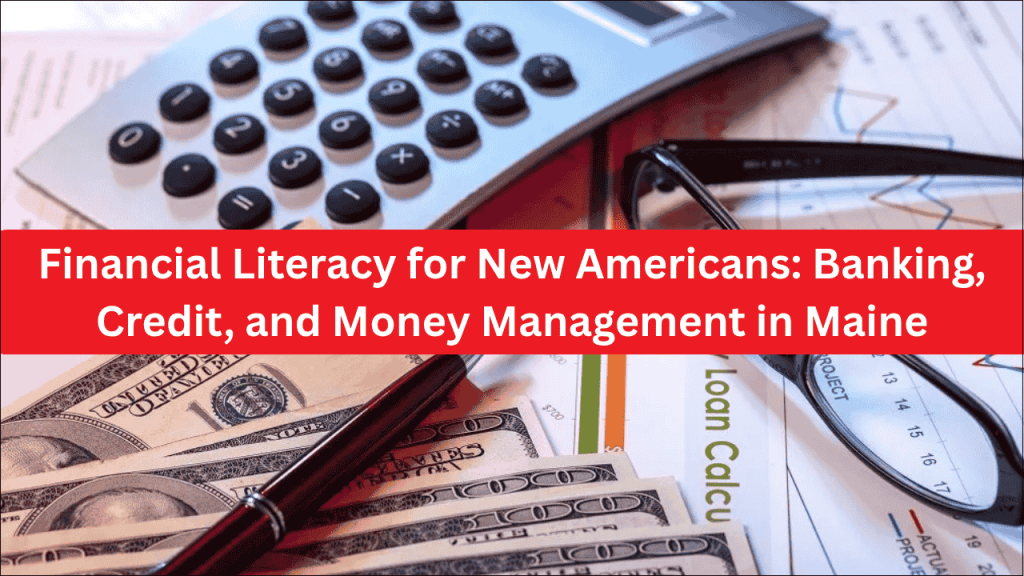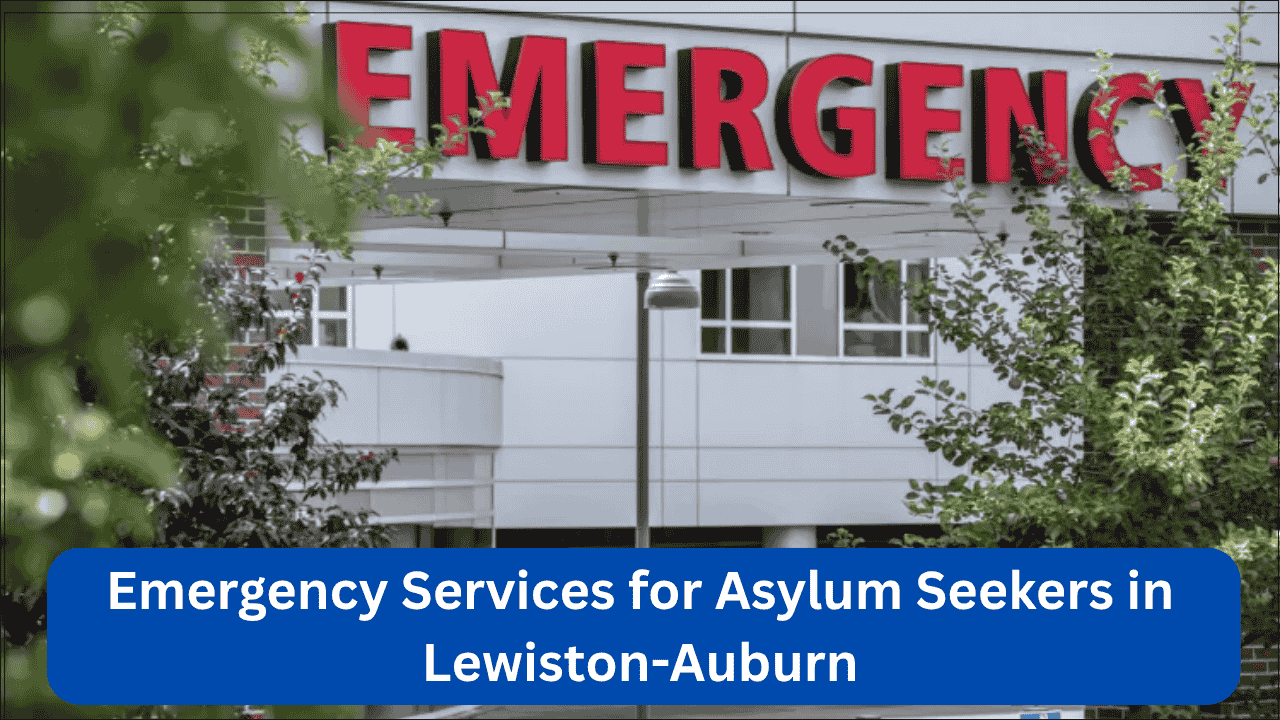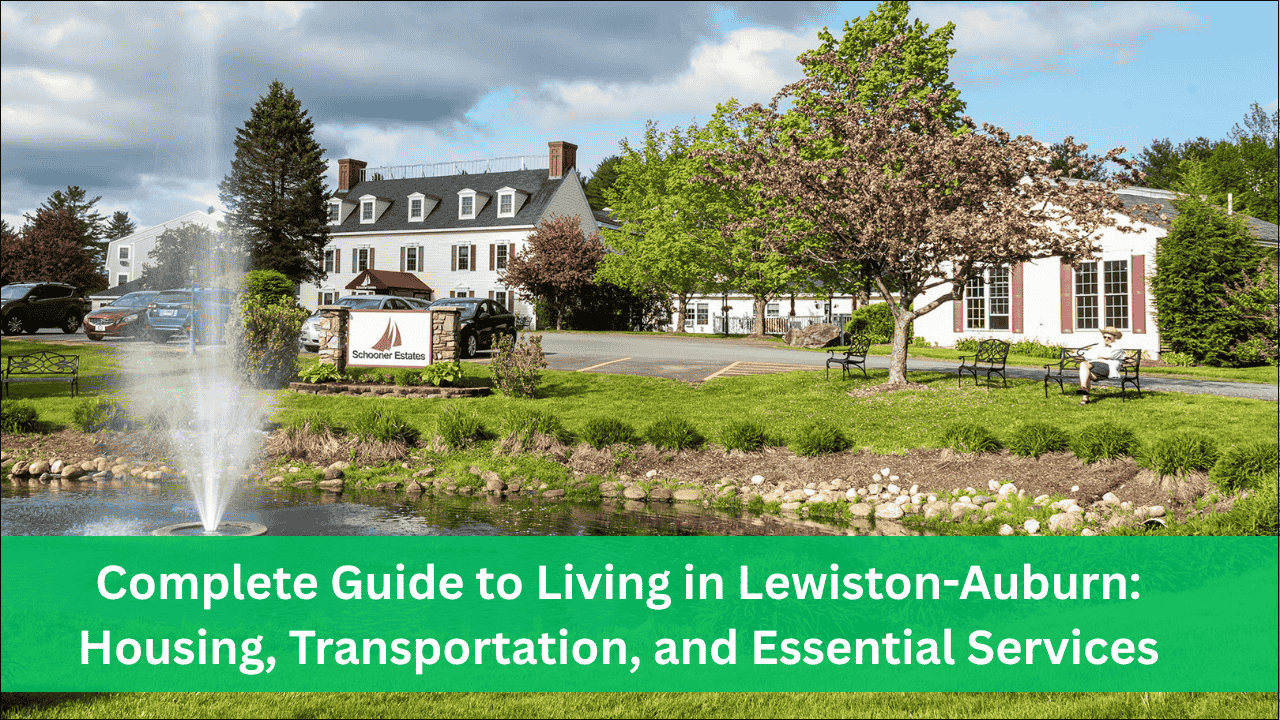
Understanding money matters is important for everyone, especially for new Americans settling in Maine. Many immigrants face challenges with the banking system, using credit wisely, and managing their money in a new financial environment. A clear understanding of financial literacy helps immigrants avoid debt, save for emergencies, and plan for the future.
Table of Contents
Banking in Maine for New Americans
Opening a Bank Account
- Basic Requirement: Identification such as a passport, immigrant visa, or a government-issued ID.
- Types of Accounts:
- Checking Account: Used for daily spending.
- Savings Account: Helps save money with interest.
- Initial Deposit: Some banks require a small opening deposit (e.g., $25 or $50).
- Common Banks in Maine: TD Bank, Bangor Savings Bank, Camden National Bank, and local credit unions.
Benefits of a Bank Account
- Safe Money Storage: Keeps cash secure from theft or loss.
- Direct Deposit: Allows paychecks or government benefits to be sent directly to the account.
- Online Banking: Provides easy access to account details, transfers, and bill payments.
Common Banking Terms
| Term | Meaning |
|---|---|
| Overdraft | When spending is more than the balance in the account, often results in fees |
| ATM | Machine used to withdraw or deposit money |
| Routing Number | Bank identification number for electronic transfers |
| PIN | Personal Identification Number for ATM or card use |
| FDIC Insured | Protection for deposits up to $250,000 per account |
Understanding Credit in the U.S.
What Is Credit?
- Credit means borrowing money to pay for something now and paying it back later, usually with interest.
- Credit Score is a number (300 to 850) that shows how trustworthy a person is with borrowed money.
Types of Credit
- Credit Cards: Useful for purchases and building credit history.
- Loans: Includes car loans, student loans, and personal loans.
How to Build Good Credit
- Pay Bills on Time: Late payments hurt credit scores.
- Use Credit Wisely: Keep balances low.
- Monitor Credit Reports: Check for errors through websites like AnnualCreditReport.com.
- Avoid Too Many Credit Applications: Many inquiries can lower the score.
Credit Score Ranges
| Score Range | Meaning |
|---|---|
| 300–579 | Poor Credit |
| 580–669 | Fair Credit |
| 670–739 | Good Credit |
| 740–799 | Very Good Credit |
| 800–850 | Excellent Credit |
Money Management Tips
Creating a Budget
- Income: List all sources of money (job, benefits, etc.).
- Expenses: Track all spending (rent, food, transportation).
- Savings: Set aside a portion each month, even if small.
- Balance: Make sure expenses do not exceed income.
Smart Spending Habits
- Make Shopping Lists: Avoid buying unnecessary items.
- Compare Prices: Use apps or flyers to find the best deals.
- Avoid Impulse Buys: Wait 24 hours before making non-essential purchases.
Using Public Services
- Financial Counseling: Organizations like ProsperityME offer help in budgeting and credit.
- Community Classes: Local adult education centers provide money management courses.
Common Budget Categories
| Category | Examples |
|---|---|
| Housing | Rent, utilities, maintenance |
| Food | Groceries, dining out |
| Transportation | Gas, public transport, car insurance |
| Health | Insurance, doctor visits, medications |
| Savings | Emergency fund, retirement, children’s education |
Avoiding Financial Scams
Common Scams
- Fake Job Offers: Asking for payment to get hired.
- Phishing Emails: Asking for bank or personal info.
- Lottery or Prize Scams: Claiming you won something you never entered.
How to Stay Safe
- Never Share Personal Info: Banks will not ask for passwords over the phone or email.
- Check Phone Numbers: Call official numbers from the bank’s website.
- Ask for Help: Seek support from community organizations if unsure.
Resources in Maine for Financial Education
Local Organizations Offering Help
| Organization | Services Offered |
|---|---|
| ProsperityME | Free financial classes for immigrants in budgeting, credit, and taxes |
| New Ventures Maine | Workshops on savings, credit building, and starting small businesses |
| Catholic Charities | Support for new Americans with job placement and financial literacy training |
| United Way of Maine | Connections to housing, income, and financial support services |
Languages Offered
- Multilingual Support: Many programs offer assistance in Arabic, French, Somali, and Spanish.
Free Tax Help
- VITA (Volunteer Income Tax Assistance): Helps low-income residents file taxes at no cost.
Using Technology for Money Management
Helpful Apps
- Mint: Tracks spending and creates budgets.
- GoodBudget: Uses envelope-style planning for saving and spending.
- MyFICO: Monitors credit scores and credit history.
Online Banking Safety Tips
- Use Strong Passwords: Avoid using birth dates or names.
- Enable Alerts: Get notified of large transactions.
- Logout After Use: Especially when using shared devices.
Cultural Challenges and Solutions
Challenges Faced by New Americans
- Language Barriers: Difficulties understanding terms used in banking or credit documents.
- Trust Issues: Fear of using banks due to past experiences in home countries.
- Limited Access: Rural areas may have fewer financial institutions.
Solutions
- Financial Mentors: Local volunteers who guide immigrants step-by-step.
- Translated Resources: Government and non-profits offer brochures and websites in multiple languages.
- Mobile Banking: Helps those without nearby banks handle finances digitally.
Steps to Start Financial Life in Maine
Checklist for New Americans
| Step | Action |
|---|---|
| Get a State ID | Needed for opening accounts and employment |
| Open a Checking Account | Choose a trusted bank with low fees |
| Set Monthly Budget | Write down income and necessary expenses |
| Apply for a Credit Card | Start building credit with secured or low-limit cards |
| Learn About U.S. Taxes | Understand what needs to be filed and when |
| Attend Workshops | Join local financial literacy classes |
Parting Insights
Financial literacy provides the foundation for a stable and secure life for new Americans in Maine. Knowing how to use banks, manage credit, and plan money wisely can prevent stress and help families achieve their goals. With support from local organizations, access to financial education, and awareness of scams, immigrants in Maine can build strong financial habits and feel more confident in their daily lives.





